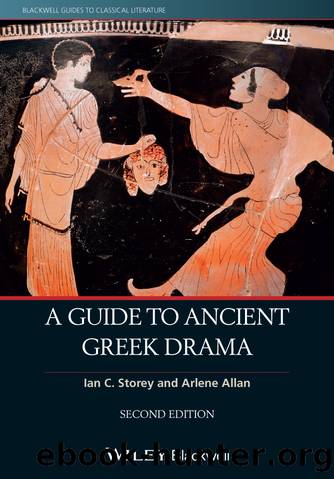A Guide to Ancient Greek Drama by Ian C. Storey & Arlene Allan

Author:Ian C. Storey & Arlene Allan
Language: eng
Format: epub
Publisher: Wiley
Published: 2013-10-21T16:00:00+00:00
Herakles' typical behavior, “he gulped down the kindling and the coals” is the subject of F 29. The interesting comparison of Greek and foreign life-styles at F 24, “it is better to know about perfume and myrrh and Sardian adornment for the skin than about the way of life on Pelops' island,” was perhaps spoken by Omphale or a member of her court, but Herakles converted to la dolce vita is also a possibility.
Agathon (TrGF 39) seems to have had only a short career at Athens. He won with his first tragedy at the Lenaia of 416, and he has left Athens by 405 (Frogs 83–5). That his career at Athens lasted but a decade may explain why only six titles are attested for him. But he has attracted our attention through his appearance in two well-known texts, caricatured as the effete poet in Aristophanes' Women at the Thesmophoria (411) and then as a central figure in Plato's seminal work, Symposium. Both works combine to produce a picture of Agathon as the beautiful tragedian, both in person and in his works, whose lyrics cause the old man in Aristophanes' comedy to shiver in erotic delight and whose speech in Plato is a brilliant party-piece about Love as Beauty. Aristotle records two distinct contributions to the development of tragedy, that he was the first to write choral lyrics that had no relevance to their plot but were interchangeable between plays (embolima “interludes”: Poetics 1456a25) and that his play Antheus contained an invented plot with non-traditional characters and “it pleases no less” (Poetics 1451b19).
Only a few dozen fragments remain, only a couple more than two lines in length. Of these F 6 (Telephos) shows a character unfamiliar with writing explaining the letters of the name “Theseus,” “the first character was a circle with a stone in the middle,” that is Θ or theta. Agathon was known for his antithetical expressions, of which F 12 is a good instance:
If I tell you the truth, I will not please you; if I am to please you, I will not tell the truth.
Download
This site does not store any files on its server. We only index and link to content provided by other sites. Please contact the content providers to delete copyright contents if any and email us, we'll remove relevant links or contents immediately.
The Power of Myth by Joseph Campbell & Bill Moyers(1058)
Half Moon Bay by Jonathan Kellerman & Jesse Kellerman(979)
Inseparable by Emma Donoghue(976)
A Social History of the Media by Peter Burke & Peter Burke(976)
The Nets of Modernism: Henry James, Virginia Woolf, James Joyce, and Sigmund Freud by Maud Ellmann(900)
The Spike by Mark Humphries;(809)
The Complete Correspondence 1928-1940 by Theodor W. Adorno & Walter Benjamin(783)
A Theory of Narrative Drawing by Simon Grennan(775)
Culture by Terry Eagleton(771)
Ideology by Eagleton Terry;(733)
World Philology by(712)
Farnsworth's Classical English Rhetoric by Ward Farnsworth(711)
Bodies from the Library 3 by Tony Medawar(708)
Game of Thrones and Philosophy by William Irwin(707)
High Albania by M. Edith Durham(699)
Adam Smith by Jonathan Conlin(687)
A Reader’s Companion to J. D. Salinger’s The Catcher in the Rye by Peter Beidler(686)
Comic Genius: Portraits of Funny People by(649)
Monkey King by Wu Cheng'en(647)
